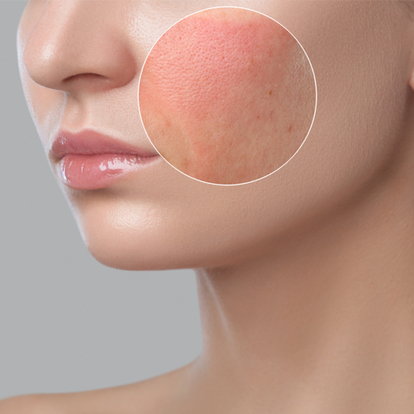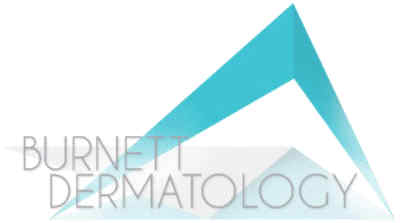 OVERVIEW
OVERVIEW
Mainly affecting the skin on your face, rosacea is a long-lasting skin condition. Since the symptoms of rosacea can be similar to other skin issues like acne, getting your skin looked at by a board-certified dermatologist can help in developing a specialized plan of treatment that’s right for you.
Here’s what you need to know about rosacea, including common treatments to help manage the symptoms of this chronic condition and leave you feeling at ease with your skin.
What is Rosacea?
A chronic skin disease, rosacea, results in a rash and redness on your face, primarily your forehead, nose, chin, and cheeks. For some people, rosacea can also affect the eyes.
According to WebMD, there are four different types of rosacea:
- Facial rosacea
This type of rosacea is most prominent on your face. Your skin turns red, stings, swells, and burns more quickly than other people. If left untreated, this could progress into rough and dry patches of skin.
- Acne rosacea
Acne rosacea presents as bumps that resemble acne; sometimes, they can be filled with pus.
- Thickened skin
A rare form, people will likely develop another type of rosacea before this can happen around your forehead, cheeks, chin, ears, and nose.
- Ocular rosacea
This type of rosacea affects the eyes resulting in bloodshot eyes—due to broken blood vessels. Some people may also experience a gritty texture, as well as oversensitivity to light.
What are the Symptoms of Rosacea?
As rosacea progresses, it can turn into pimples, bumps, and broken blood vessels. Other symptoms of rosacea can include:
- Flushing or frequent redness to your face
- Swollen nose
- Thickened skin
- Red, itchy, dry eyes
- Blurred vision
How is Rosacea Diagnosed?
A dermatologist can help accurately diagnose your rosacea. While there is no exact cause of this skin condition, a thorough evaluation of your overall health and family history of the disease can help in diagnosis—you may be more predisposed to developing rosacea if you have a family history of the disease.
Environmental conditions such as increased exposure to the sun or UV radiation can result in the formation of rosacea. According to the U.S. National Library of Medicine, other external factors that lead to the dilation of blood vessels in your skin can include:
- Spicy food
- Smoking
- Alcohol
- Exposure to high temperatures
Treatment for Rosacea is Safe When Performed by a Board-Certified Dermatologist
While there is no current cure for rosacea, finding an individualized treatment plan that works for just you can help you manage and even lessen the severity of the symptoms when they do occur.
Some common treatments for rosacea include:
- Topical ointments
These can contain vasoconstrictors—used to narrow blood vessels and reduce redness
- Eye drops
Prescribed for people with ocular rosacea.
- Antibiotics
For patients with severe rashes, these work well by decreasing inflammation.
- Laser therapy
Continued treatments of laser and light therapy can help reduce the size of blood vessels on your skin. Your dermatologist may also prescribe this form of therapy if you are experiencing thickening of the skin.


